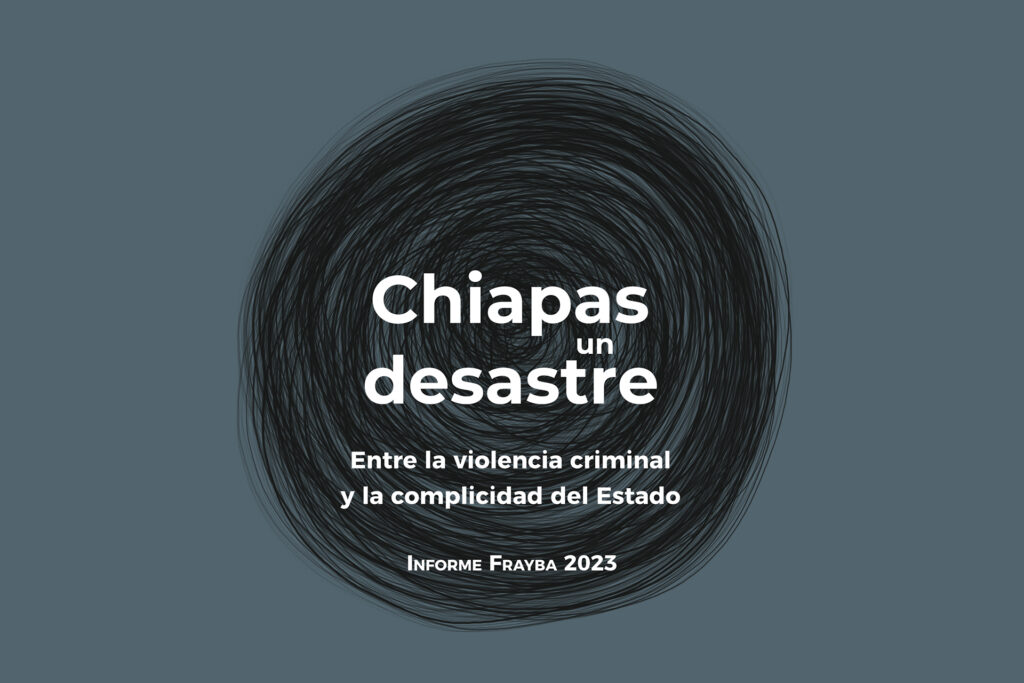
The prestigious Fray Bartolomé de Las Casas Center for Human Rights (Frayba), founded in 1989 by Bishop Samuel Ruiz García, published an impressive book in March of this year on a very relevant topic in national events that is significantly titled: ‘’Chiapas, a Disaster. Between Criminal Violence and State Complicity’’ (Creative Commons). Guided “by the deepest sense of peace, where the fire of life burns”, the ever-efficient and committed Frayba team presents a detailed and supported report that it considers an x-ray of the current situation, with an emphasis on the state of Chiapas, and a timeline that goes from 2020 to 2022 (https://frayba.org.mx/informe-frayba-chiapas-un-desastre).
The text is based on the hypothesis, undoubtedly proven, that in a national environment of militarization – deepened by a neo-developmentalist and authoritarian government that bets on the continuity of the war that benefits the actual powers of Mexico, the rise of generalized violence and the increase in the human rights crisis -, in the southern state there is a diversification and opacity of armed groups that use violence for social, political, economic and territorial control, marked by the continuity of a counterinsurgency strategy, as well as an impunity fostered by state players that contributes to dispossession, exploitation and social marginalization.
The document highlights the fact that the national and international environment in support of the Zapatista Army of National Liberation and the National Indigenous Congress has been repeatedly denouncing attacks and armed harassment against the Zapatista communities by these corporatist organizations aligned with the State, which enter into open dispute over land recovered since 1994. The fragmentation and territorial reconfiguration from the project, the backbone of the current federal administration, Sowing Life (Sembrando Vida), reaping death, is analyzed in depth. It is confirmed that internal forced displacement is one of the phenomena with the greatest exacerbation of the state, with forms of violence that involve patterns of local and daily action linked to territorial control, by these armed groups and sectors of regional politics that direct and support them.
The report argues that the pandemic crisis made structural racism and discrimination more noticeable and profound, evidencing marginalization, high poverty rates, precariousness and lack of access to basic health services, which even gave rise to a call by the United Nations to take measures regarding the incidence of COVID-19 in indigenous peoples.
These realities induce a deepening of the work of defenders of human rights, land and territory, as well as journalists and communicators, which brings with it an increase in attacks, which Frayba considers a constant and systematic phenomenon to silence the voices of denunciation, with acts such as threats and intimidation, and smear campaigns, among others. In most cases, the perpetrators are not identified, investigated, much less punished, for which reason “impunity continues in this government of the Fourth Transformation, and taking into account that Mexico is one of the countries with the most murders of defenders and journalists, and with a greater degree of impunity for those crimes.
Cardinal in the Frayba analysis is to verify the implications of the remilitarization and the impacts of the counterinsurgency in Chiapas, from the territorial occupation by the armed forces, which has resulted in the installation of 126 military camps, the implementation of thousands of operations and the continued imposition of a de facto state of siege, all based on a comprehensive strategy of a war of attrition that has remained throughout time and been maintained by successive governments, responding to the logic of the enemy within and the dynamics of the US military doctrine, in which population control is one of its fundamental pillars. The remilitarization trends also point to the proven continuity of espionage by the military in Chiapas territories, according to information from the “SEDENA Leaks.”
For Frayba, militarization has become more complex with the presence of criminal corporations that are generating, with the complicity of governments, a spiral of violence with impacts that, up to now, have shaken the country in an adverse context and terror against the peoples and communities, circumstances that have worsened and have expanded in the territories of Chiapas in the last four years.
It is to be hoped that this investigation will not be hidden and much less stigmatized by official denial, and, on the contrary, will be taken into account in order to act accordingly.
Original article by Gilberto López y Rivas at https://www.jornada.com.mx/2023/07/07/opinion/014a2pol
Translated by Schools for Chiapas
